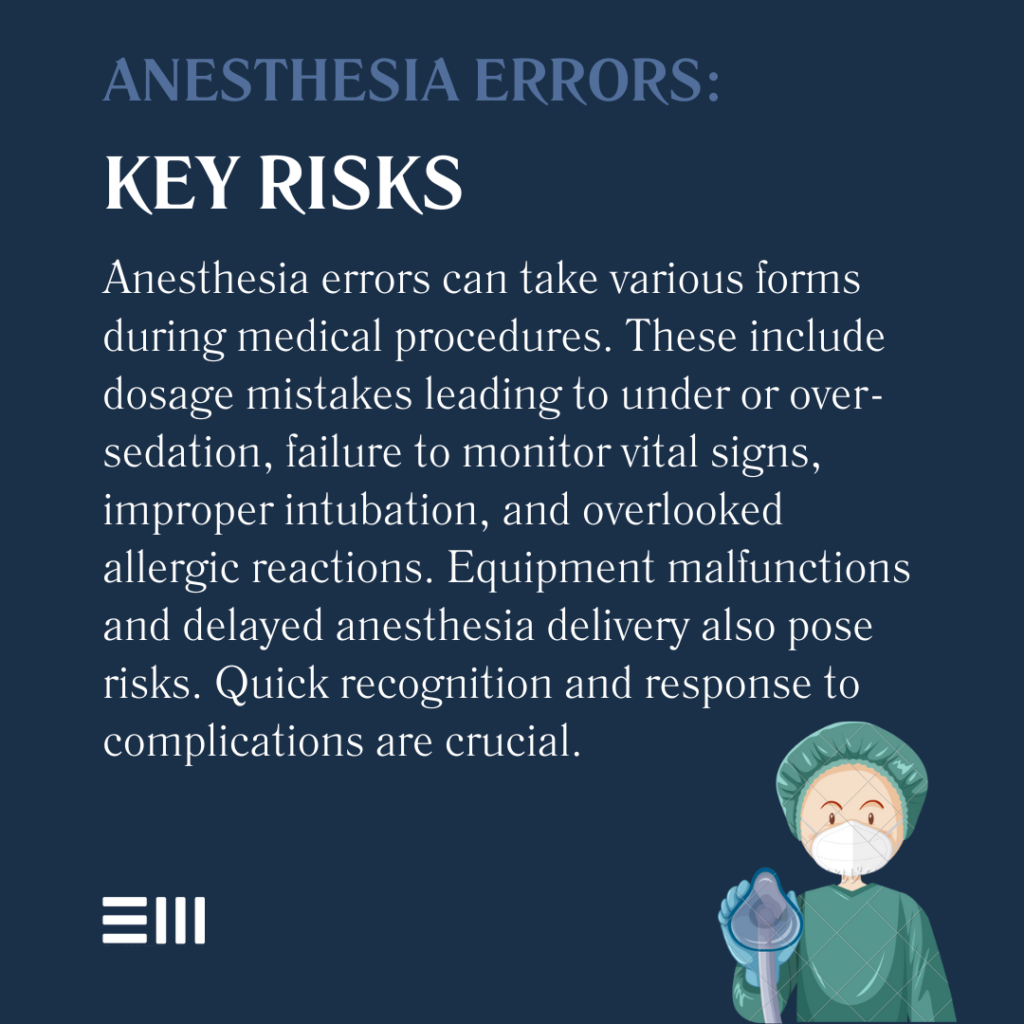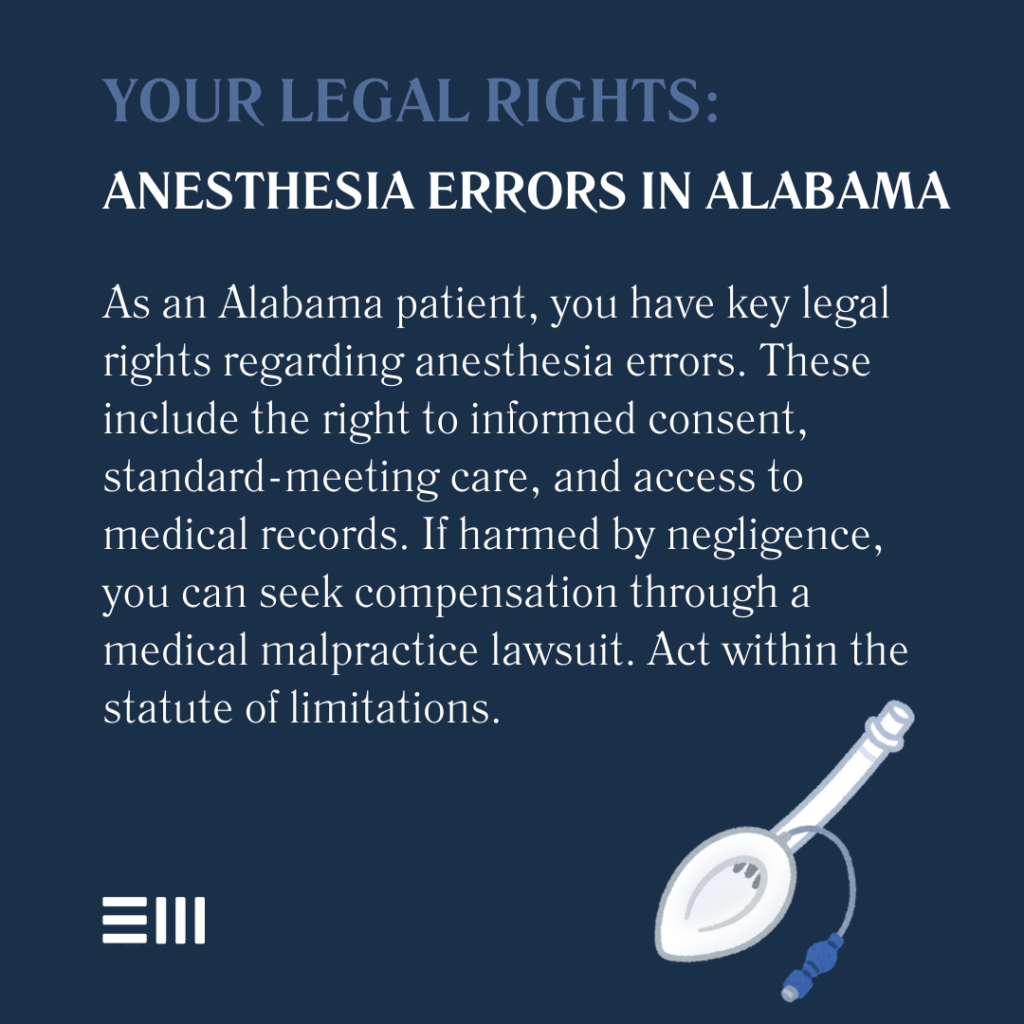
Did you know that approximately 1 in every 200,000 patients dies from anesthesia-related complications?
While this statistic may seem small, the impact of anesthesia errors can be devastating for patients and their families.
In Alabama, understanding the risks associated with anesthesia and your legal rights is crucial for protecting yourself and your loved ones should the unthinkable happen.
What Are Anesthesia Errors?
Anesthesia errors occur when mistakes are made during the administration or management of anesthesia.
These errors can range from minor oversights to severe miscalculations that lead to life-threatening complications.
Common types of anesthesia errors include:
- Dosage mistakes (too much or too little anesthesia);
- Failure to monitor vital signs;
- Improper intubation;
- Allergic reactions due to inadequate patient history review;
- Equipment malfunction or misuse;
- Delayed anesthesia delivery; and
- Failure to recognize and respond to complications.
Anesthesia errors can happen during any medical procedure requiring sedation, from routine surgeries to complex operations.
Risks Associated With Anesthesia Errors
Understanding the potential risks of anesthesia errors is essential for patients and their families.
While modern anesthesia techniques are generally safe, errors can lead to severe complications that may have long-lasting effects on a patient’s health and quality of life.
Some of the risks associated with anesthesia errors include:
- Brain damage due to oxygen deprivation;
- Cardiovascular complications;
- Nerve damage;
- Allergic reactions and anaphylaxis;
- Awareness during surgery;
- Respiratory problems;
- Organ damage; and
- Coma or death.
It’s important to note that the severity of these risks can vary depending on factors such as the patient’s age, overall health, and the type of procedure being performed.

Legal Rights of Patients in Alabama
In Alabama, patients who have suffered harm due to anesthesia errors have legal rights that protect them and provide avenues for seeking compensation.
Key legal rights for patients in Alabama include:
- The right to informed consent;
- The right to receive a standard of care consistent with medical best practices;
- The right to access medical records;
- The right to seek compensation for damages resulting from medical negligence; and
- The right to file a medical malpractice lawsuit within the statute of limitations.
It’s important to note that Alabama has specific laws and regulations governing medical malpractice cases, including those related to anesthesia errors.

How to Recognize Potential Anesthesia Errors
Identifying potential anesthesia errors can be challenging, as some symptoms may not be immediately apparent or may be attributed to other factors.
Signs that may indicate an anesthesia error has occurred include:
- Unexplained pain or discomfort during or after surgery;
- Prolonged confusion or difficulty waking up after a procedure;
- Unexpected allergic reactions;
- Breathing difficulties or respiratory problems;
- Seizures or muscle spasms;
- Blurred vision or other visual disturbances;
- Persistent headaches or migraines; and
- Unexplained heart problems or irregular heartbeat.
If you or a loved one experiences any of these symptoms following a procedure involving anesthesia, it’s crucial to seek immediate medical attention and document your concerns. This documentation can be valuable if you decide to pursue legal action later.
Steps to Take If You Suspect an Anesthesia Error
If you believe that you or a loved one has been the victim of an anesthesia error in Alabama, taking prompt and appropriate action is essential.
Following these steps can help protect your rights and strengthen your case if you decide to pursue legal action:
- Seek immediate medical attention for any complications or adverse effects;
- Document all symptoms, conversations with medical professionals, and treatments received;
- Request and obtain copies of all relevant medical records;
- Avoid signing any documents or agreeing to settlements without legal counsel;
- Consult with an experienced medical malpractice attorney familiar with Alabama laws;
- File a complaint with the appropriate medical board or regulatory agency;
- Keep detailed records of all expenses related to the error, including medical bills and lost wages; and
- Adhere to the statute of limitations for filing a medical malpractice lawsuit in Alabama.
Remember that time is of the essence in medical malpractice cases, so acting quickly and decisively is crucial to protect your rights and interests.
Alabama Laws Governing Medical Malpractice and Anesthesia Errors
Alabama has specific laws and regulations that govern medical malpractice cases, including those involving anesthesia errors. Understanding these laws is essential for anyone considering legal action related to an anesthesia error.
Key aspects of Alabama’s medical malpractice laws include:
- Statute of limitations: In Alabama, the general statute of limitations for medical malpractice cases is two years from the date of the injury or when the injury should have been discovered
- Certificate of merit: Alabama requires plaintiffs to file a detailed complaint and a certificate of merit from a qualified expert witness
- Damage caps: Alabama does not currently have caps on compensatory damages in medical malpractice cases
- Contributory negligence: Alabama follows a contributory negligence rule, which can bar recovery if the plaintiff is found to be even slightly at fault
- Expert witness requirements: Expert witnesses in medical malpractice cases must be similarly situated healthcare providers with experience in the same field as the defendant
Understanding these laws can help you navigate the legal process more effectively and make informed decisions about pursuing a medical malpractice claim related to an anesthesia error.
Proving Medical Negligence in Anesthesia Error Cases
To successfully pursue a medical malpractice claim for an anesthesia error in Alabama, you must be able to prove that negligence occurred.
This involves demonstrating that the anesthesiologist or other medical professionals involved in your care failed to meet the accepted standard of care, resulting in harm to you or your loved one.
Elements required to prove medical negligence in anesthesia error cases include:
- Establishing a doctor-patient relationship;
- Demonstrating that the anesthesiologist or medical professional breached the standard of care;
- Proving that the breach of care directly caused your injuries; and
- Showing that you suffered damages as a result of the error.
Gathering evidence to support these elements is crucial for building a strong case. This may involve expert testimony, medical records, witness statements, and other forms of documentation.
Compensation Available for Victims of Anesthesia Errors
If you or a loved one has suffered harm due to an anesthesia error in Alabama, you may be entitled to various forms of compensation. The specific damages available will depend on the circumstances of your case and the extent of your injuries.
Potential forms of compensation in anesthesia error cases include:
- Medical expenses (past and future);
- Lost wages and loss of earning capacity;
- Pain and suffering;
- Emotional distress;
- Loss of enjoyment of life;
- Disability or disfigurement; and
- Wrongful death damages (in cases of fatal errors).
It’s important to work with an experienced medical malpractice attorney who can help you accurately calculate and pursue the full range of damages to which you may be entitled.
Preventing Anesthesia Errors: Patient Responsibilities
While medical professionals bear the primary responsibility for preventing anesthesia errors, patients can also take steps to reduce their risk. By being proactive and informed, you can help ensure a safer experience when undergoing procedures involving anesthesia.
Steps patients can take to help prevent anesthesia errors include:
- Providing a complete and accurate medical history, including all medications and supplements;
- Discussing any previous reactions to anesthesia with your healthcare providers;
- Following all pre-operative instructions carefully, especially regarding food and drink restrictions;
- Asking questions about the anesthesia process and potential risks;
- Ensuring that your anesthesiologist is aware of any allergies or sensitivities;
- Bringing a trusted friend or family member to advocate for you before and after the procedure; and
- Informing your healthcare team of any unexpected symptoms or concerns during recovery.
By taking an active role in your healthcare and maintaining open communication with your medical team, you can help reduce the risk of anesthesia errors and improve your overall surgical experience.
Frequently Asked Questions About Anesthesia Errors and Legal Rights
Understanding anesthesia errors and your legal rights can be complex. Here are answers to some commonly asked questions to help clarify key points.
What’s the Difference Between General and Local Anesthesia?
General anesthesia involves putting the patient into a state of unconsciousness, while local anesthesia numbs a specific area of the body. Both types can be associated with errors, but the risks and potential complications may differ.
How Long Do I Have to File a Lawsuit for an Anesthesia Error in Alabama?
In Alabama, the statute of limitations for medical malpractice cases, including those involving anesthesia errors, is generally two years from the date of the injury or when the injury should have been discovered. However, there are exceptions to this rule, so it’s best to consult with an attorney as soon as possible.
Can I Sue if I Experienced Awareness During Surgery?
Yes, if you experienced awareness during surgery due to an anesthesia error, you may have grounds for a medical malpractice lawsuit. This type of error can cause severe emotional distress and psychological trauma.
What if the Anesthesia Error Resulted in a Fatality?
If an anesthesia error results in death, the deceased’s family members may be able to file a wrongful death lawsuit. Alabama has specific laws governing wrongful death cases, so it’s crucial to consult with an experienced attorney.
Recover the Compensation You Deserve for Your Anesthesia Error Case
Have you or a loved one suffered harm due to an anesthesia error in Alabama? Don’t face this challenging situation alone.
The experienced medical malpractice attorneys at Baxley Maniscalco are here to help you understand your rights and fight for the compensation you deserve.
Can't find what you're looking for? Search our site below.










